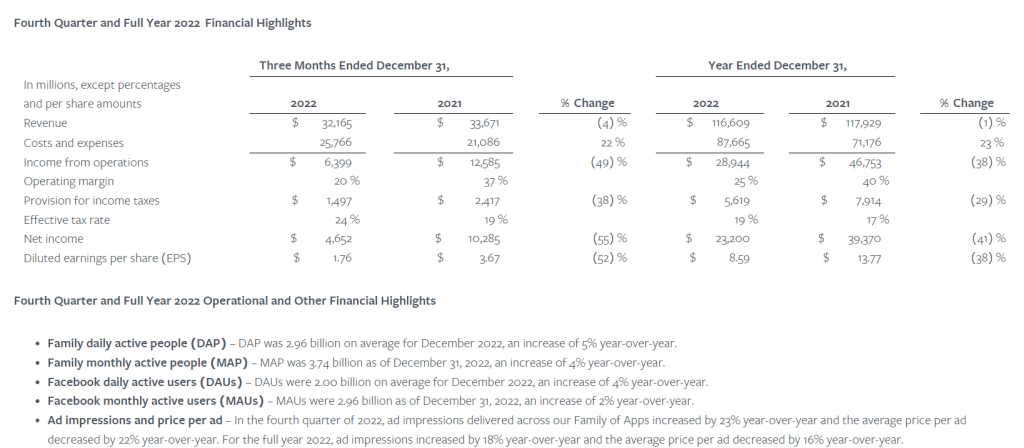Before we dive deep into the PESTEL analysis, let’s get the business overview of Facebook/Meta. Facebook Inc., now known as Meta Platforms Inc., is one of the world’s leading technology companies. The company was initially founded in 2004 by Mark Zuckerberg, Eduardo Saverin, Andrew McCollum, Dustin Moskovitz, and Chris Hughes. Its headquarters are located in Menlo Park, California.
Facebook’s primary service is its social networking platform, which allows users to post comments, share photographs, post links to news or other interesting content on the web, chat live, watch short-form videos, and share status updates. The company’s namesake product also includes a suite of tools for businesses, such as Facebook Pages, Ads, and Marketplace.
Other important products and services provided by Facebook (Meta) include:
- Instagram: A photo and video-sharing social networking service.
- WhatsApp: A popular global messaging app offering voice and video calling capabilities.
- Messenger: Facebook’s messaging platform supports voice and video calls.
- Oculus: A platform focused on virtual reality hardware and software products.
In October 2021, the company rebranded itself as Meta Platforms Inc. to reflect its growing focus on the “metaverse,” a term used to describe a shared, virtual space that’s accessible using both traditional devices like smartphones and computers, as well as immersive technologies like virtual and augmented reality.
Facebook (Meta) monetizes its platforms primarily through advertising, representing most of its revenue. Businesses of all sizes can use Facebook’s ad-targeting tools to reach specific demographics, making it a valuable platform for marketers. The company also generates revenue from hardware sales (like Oculus devices) and various other services.
How does Facebook (Meta) make money: Business Model Analysis

Here is the PESTEL analysis of Facebook/Meta
A PESTEL analysis is a strategic management framework used to examine the external macro-environmental factors that can impact an organization or industry. The acronym PESTEL stands for:
- Political factors: Relate to government policies, regulations, political stability, and other political forces that may impact the business environment.
- Economic factors: Deal with economic conditions and trends affecting an organization’s operations, profitability, and growth.
- Sociocultural factors: Relate to social and cultural aspects that may influence consumer preferences, lifestyles, demographics, and market trends.
- Technological factors: Deal with developing and applying new technologies, innovations, and trends that can impact an industry or organization.
- Environmental factors: Relate to ecological and environmental concerns that may affect an organization’s operations and decision-making.
- Legal factors: Refer to the laws and regulations that govern businesses and industries.
This article will do a PESTEL Analysis of Facebook/Meta.
PESTEL Analysis Framework: Explained with Examples
Political
1. Data Privacy Regulations: One of the main political factors that impact Facebook involves data privacy regulations. Laws such as the General Data Protection Regulation (GDPR) in the European Union and the California Consumer Privacy Act (CCPA) in the United States regulate how companies collect, store, and use consumer data. These laws can heavily influence Facebook’s operations, as the company relies on user data for ad targeting.
2. Content Regulation: There has been an increasing call for regulation on the content shared on Facebook’s platform. Governments worldwide are concerned about misinformation, hate speech, political manipulation, and other potentially harmful content. This can lead to increased regulatory scrutiny and potential legislation, requiring Facebook to invest more heavily in content moderation and algorithm oversight.
3. International Relations: Facebook operates in many countries with unique political climates. Political tensions, censorship laws, and the overall relationship between those countries and the United States can influence the platform’s presence in various regions. For instance, Facebook has been banned in several countries, including China and North Korea.
4. Taxation Policies: Changes in taxation policies, particularly in regions where Facebook has significant operations, could substantially impact the company’s financial health. The Organisation for Economic Co-operation and Development (OECD) has been discussing new international tax rules that could affect large multinational tech companies like Facebook.
5. Government Investigations and Legal Challenges: Facebook has been the subject of government investigations in various countries, often concerning anti-competitive practices, privacy breaches, or the spreading of harmful content. The outcomes of these investigations could lead to fines, operational changes, or reputational damage.
Economic
1. Global Economic Conditions: As a global company, Facebook’s financial performance can be influenced by the overall state of the global economy. Economic downturns or recessions can reduce advertising spend, which is Facebook’s primary revenue source. Similarly, economic growth can boost advertising spend, increasing Facebook’s revenues.
2. Exchange Rates: As a global company, Facebook earns revenue in many different currencies. Therefore, fluctuations in exchange rates can impact its financial performance. If the U.S. dollar strengthens compared to other currencies, Facebook’s revenue from other countries can decrease when converted back to dollars. Conversely, if the dollar weakens, it can increase Facebook’s revenue in dollar terms.
3. Inflation and Interest Rates: Changes in inflation and interest rates can impact Facebook’s cost of borrowing and investment returns. Higher inflation can increase the cost of expenses, while higher interest rates can increase the cost of any debt Facebook has.
4. Digital Advertising Market: The size and growth rate of the digital advertising market are critical economic factors for Facebook. The company’s revenues are primarily driven by advertising spend, so trends and growth in the digital advertising market can heavily influence its financial performance.
5. Disposable Income of Users: Higher disposable income levels generally lead to higher consumer spending, which can increase advertising spend. If the disposable income levels in Facebook’s key markets are high, this could lead to increased revenues for the company.
6. Technological Investment Trends: Economic trends that impact the level of investment in technology and digital transformation could impact Facebook’s future growth opportunities, especially in emerging areas like the metaverse, artificial intelligence, and augmented/virtual reality.
Sociocultural
1. Demographic Trends: Facebook’s user base spans a variety of age groups, but demographic trends can impact the company’s growth and revenue. For instance, younger users have been gravitating towards other platforms like Instagram (also owned by Meta) and TikTok. Understanding and responding to these demographic trends is crucial for Facebook’s sustained growth.
2. Privacy Concerns: Growing societal concern over privacy, especially concerning social media platforms, can significantly impact Facebook. If users feel their data is not secure or is being misused, they may limit their platform use or abandon it altogether.
3. Changing User Behaviors: As new platforms emerge and user preferences evolve, Facebook must adapt to maintain its user base. For example, the rise of short-form video content led by platforms like TikTok could impact user engagement on Facebook.
4. Digital Well-being: There’s a growing societal concern around the impact of social media on mental health and well-being, particularly among younger users. If perceptions of Facebook become significantly negative, it could lead to reduced user engagement or increased regulation.
5. Cultural Differences: Facebook operates globally, and cultural differences can impact how its platform is used and perceived in different regions. Understanding and respecting these differences is crucial for the company’s international operations.
6. Social Movements: Facebook is often used as a platform for social movements and activism. How the company handles these situations can impact its reputation and user engagement.
7. Shift towards the Metaverse: As Meta, the company has announced a significant shift towards developing the “metaverse”—a collective virtual shared space. The speed and manner society embraces this concept will significantly influence the company’s future direction.
Technological
1. Pace of Technological Change: Technology evolves rapidly, and in the social media sector, staying current is crucial for maintaining user engagement and competitiveness. Facebook has to continually innovate and update its platform and offerings to keep up with new technologies and consumer preferences.
2. Artificial Intelligence (AI) and Machine Learning: AI and machine learning are integral to Facebook’s operations, from content personalization and ad targeting to moderation of harmful content. Advances in these technologies can help Facebook improve its services, but they also pose challenges in terms of ethical use and data privacy.
3. Cybersecurity: As a digital platform, Facebook is continuously at risk from cybersecurity threats. Breaches can lead to data loss or theft, damaging user trust and potentially leading to regulatory penalties. Keeping up with advancements in cybersecurity technology is thus crucial for Facebook.
4. Data Analytics: Technological advancements in data collection and analysis can benefit Facebook by providing more insights into user behavior, which can drive more personalized content and targeted advertising. However, using such technologies must be balanced with user privacy concerns.
5. Virtual and Augmented Reality: With its acquisition of Oculus and its focus on the “metaverse,” Facebook is heavily invested in virtual and augmented reality technologies. The company’s future success could depend significantly on these technologies’ broader adoption and development.
6. Infrastructure Development: Internet infrastructure availability and quality in different regions can impact Facebook’s user base and growth opportunities. Technological advancements in this area, like the spread of high-speed internet or the development of 5G networks, can affect Facebook’s potential reach and performance.
7. Competition and Innovation in the Tech Industry: The tech industry is characterized by intense competition and constant innovation. Technological advancements by competitors can threaten Facebook, while new technologies can also present opportunities for growth and diversification.
Environmental
1. Energy Usage: Data centers, vital for Facebook’s operations, consume significant energy. There’s growing public and regulatory pressure on tech companies to reduce their environmental footprint. Like many other companies, Facebook has committed to using 100% renewable energy to power its operations.
2. E-Waste: Facebook’s hardware ventures, like Oculus virtual reality headsets, contribute to electronic waste (e-waste). The lifecycle of these products, from production to disposal, can have environmental impacts.
3. Climate Change: Climate change is a global issue affecting businesses across industries. Facebook may face pressure from users, employees, shareholders, and regulators to take more decisive action on climate change. This can include reducing its carbon footprint and using its platform to promote climate awareness and action.
4. Disaster Response: Facebook’s platform is often used for information sharing and emergency communication during natural disasters or environmental crises. The company’s effectiveness in these situations can impact its reputation.
5. Supply Chain Sustainability: The environmental impact of Facebook’s supply chain is another significant concern. This includes the production processes of its hardware products and materials sourcing.
6. Water Usage: While often overlooked, data centers can consume large quantities of water for cooling. In areas with water scarcity, this can be a significant environmental issue.
Legal
1. Data Protection and Privacy Laws: Privacy laws, such as the European Union’s General Data Protection Regulation (GDPR) and the California Consumer Privacy Act (CCPA), dictate how companies collect, store, and use user data. As Facebook’s operations heavily rely on user data, these laws can significantly impact the company.
2. Content and Copyright Laws: Given the content shared on Facebook’s platforms, the company must continually deal with issues related to copyright infringement, hate speech, false information, and more. The handling of such content is often subject to local and international laws.
3. Antitrust Laws: Facebook, along with other tech giants, has faced antitrust scrutiny in multiple jurisdictions, with authorities investigating potential anti-competitive practices. The outcome of these cases could potentially result in substantial fines, operational changes, or even breaking up parts of the business.
4. Employment Laws: As a global employer, Facebook must comply with the labor laws of all the countries in which it operates. These can relate to wages, benefits, working conditions, diversity, inclusion, etc.
5. Tax Laws: Facebook’s operations span numerous countries with unique tax laws and regulations. The company has faced criticism and legal challenges in the past over its tax practices.
6. Cybersecurity Laws: As a digital platform, Facebook is subject to cybersecurity and data breach laws. Non-compliance or violations can lead to substantial penalties.
7. Laws Related to Libel, Defamation, and Censorship: As a platform hosting user-generated content, Facebook must navigate complex legal issues related to libel, defamation, and censorship across various jurisdictions.











